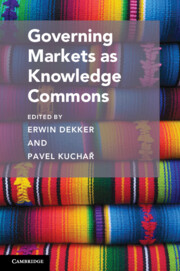Book contents
- Governing Markets as Knowledge Commons
- Cambridge Studies on Governing Knowledge Commons
- Governing Markets as Knowledge Commons
- Copyright page
- Contents
- Contributors
- Preface
- Acknowledgments
- Introduction
- 1 The Contribution Good as the Foundation of the Industrial Revolution
- 2 On the Social Evolution of Knowledge
- 3 Individual Sovereignty and Coproduction of Knowledge Governance
- 4 Common Sense Commons
- 5 Conventions as Shared Cognitive Infrastructures
- 6 Property Rights, Knowledge Commons, and Blockchain Governance
- 7 Knowledge Commons, Social Infrastructures, and Informal Markets
- 8 Entrepreneurship and Governance in the Scotch Whisky Knowledge Commons
- 9 Trolling in the Deep
- 10 Crowdfunding the Queer Museum
- 11 Understanding Different Qualities of the Knowledge Commons in Contemporary Cities
- References
10 - Crowdfunding the Queer Museum
A Polycentric Identity Quarrel*
Published online by Cambridge University Press: 09 December 2021
- Governing Markets as Knowledge Commons
- Cambridge Studies on Governing Knowledge Commons
- Governing Markets as Knowledge Commons
- Copyright page
- Contents
- Contributors
- Preface
- Acknowledgments
- Introduction
- 1 The Contribution Good as the Foundation of the Industrial Revolution
- 2 On the Social Evolution of Knowledge
- 3 Individual Sovereignty and Coproduction of Knowledge Governance
- 4 Common Sense Commons
- 5 Conventions as Shared Cognitive Infrastructures
- 6 Property Rights, Knowledge Commons, and Blockchain Governance
- 7 Knowledge Commons, Social Infrastructures, and Informal Markets
- 8 Entrepreneurship and Governance in the Scotch Whisky Knowledge Commons
- 9 Trolling in the Deep
- 10 Crowdfunding the Queer Museum
- 11 Understanding Different Qualities of the Knowledge Commons in Contemporary Cities
- References
Summary
This chapter studies the Queer Museum, an art exhibition held in Brazil, to discuss how identities can be interpreted as knowledge commons and the importance of polycentric institutional settings. The chapter uses the notion of institutional polycentricity to demonstrate that agents actively create solutions to face market-state constraints and better govern resources such as art and identity expressions. One of these solutions is crowdfunding, an alternative open funding mechanism that can act as both an enabling infrastructure and a resource that agents draw on to pursue their common goals. Finally, the chapter argues that certain types of knowledge commons (i.e., identities) develop especially in situations of public contestation and that, in such cases, they benefit from a diverse institutional setting. These identity struggles for representation ultimately fuel markets, social life in general and feedback into established organizations.
- Type
- Chapter
- Information
- Governing Markets as Knowledge Commons , pp. 238 - 255Publisher: Cambridge University PressPrint publication year: 2021
References
- 2
- Cited by

